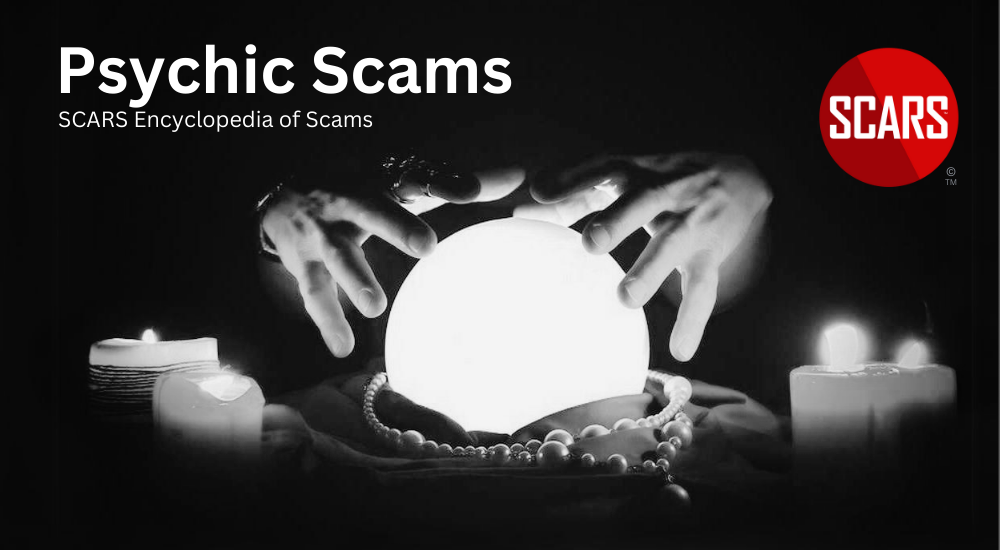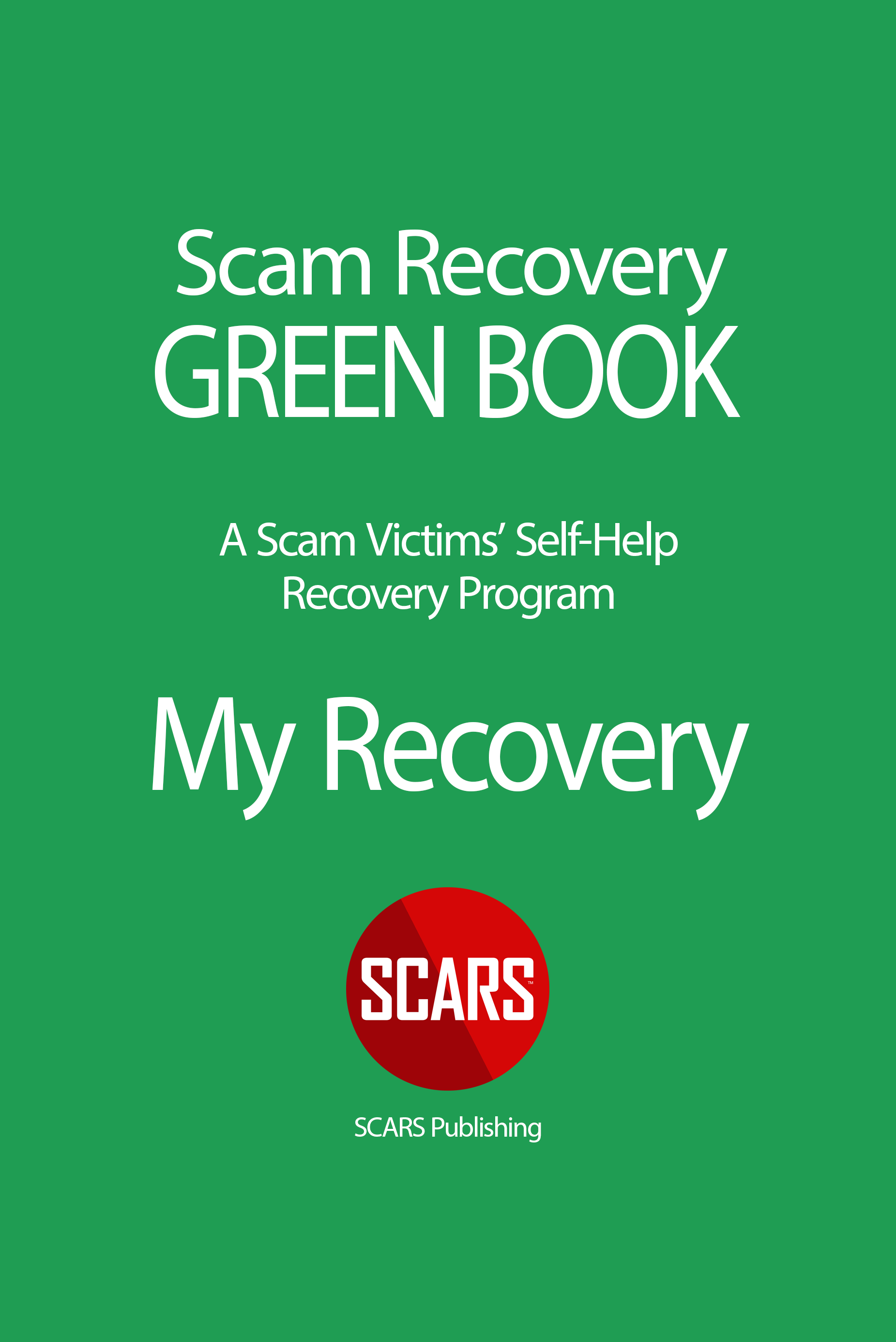
SCARS Institute’s Encyclopedia of Scams™ Published Continuously for 25 Years

Authors:
• SCARS Institute Encyclopedia of Scams Editorial Team – Society of Citizens Against Relationship Scams Inc.
Article Abstract
Psychic scams, where fraudsters claim supernatural abilities for profit, exploit people’s belief in the paranormal and their need for guidance during life’s uncertainties. These scams operate through various mediums such as storefronts, websites, and social media, offering services like tarot readings and spiritual cleansing.
People fall for psychic scams due to their desire for control and certainty, especially during crises, and due to cognitive biases like the confirmation bias, Barnum Effect, and magical thinking. These biases make individuals focus on confirming their beliefs, accept vague statements as personally meaningful, and believe in supernatural causality.
Victims, often seeking clarity or reassurance, may face severe financial and emotional consequences, including dependency on the psychic, increased anxiety, and financial ruin. Psychics exploit these vulnerabilities using manipulative techniques, reinforcing trust with false promises, and isolating victims from support networks.
To combat this, educating people on the signs of psychic scams and promoting critical thinking is essential in protecting individuals from such exploitations.

Psychic Scams Exploit The Vulnerabilities in Scam Victims Stealing Money and In Many Cases Destroying Lives!
Psychic scams are a form of fraud where individuals purport to possess supernatural abilities to predict the future, communicate with spirits, or offer spiritual guidance in exchange for money. These scams exploit people’s beliefs in the paranormal and their desire for answers, guidance, or closure in various aspects of their lives.
Typically, psychic scams are perpetrated by individuals who present themselves as psychics, mediums, or spiritual advisors. They often operate through storefronts, websites, phone hotlines, or social media platforms, offering services such as tarot card readings, palmistry, astrology, or spiritual cleansing, and even sometimes dark magic and curses. Some may claim to have inherited their abilities through generations or received special training from renowned spiritual teachers. In the state of Florida in the U.S. there is even a whole town of psychics
Why Do People Believe Psychics?
People believe in psychics and are susceptible to their scams for several reasons rooted in psychological, social, and emotional factors. One key factor is the human desire for certainty and control in an uncertain world.
Life is full of unpredictable events and unknowns, and psychics offer a semblance (or appearance) of control by claiming to predict the future or reveal hidden truths. This sense of certainty can be particularly appealing during times of crisis or stress or grieving when individuals are desperate for guidance and reassurance. Psychics exploit this vulnerability by providing seemingly insightful information that resonates with the person’s hopes, fears, and desires.
Another reason people fall for psychic scams is the phenomenon of cognitive biases, such as the confirmation bias, the Barnum effect, and Magical Thinking.
Confirmation Bias leads individuals to focus on information that supports their existing beliefs and ignore evidence to the contrary. When psychics make general statements or predictions, individuals often remember the hits and forget the misses, reinforcing their belief in the psychic’s abilities.
The Barnum Effect is the tendency for people to accept vague and general statements as uniquely applicable to themselves. Psychics use cleverly worded statements that could apply to anyone, making their clients feel understood and personally connected to the psychic, further solidifying their trust.
Magical Thinking, a form of confirmation bias, involves the belief that unrelated events are causally connected through mystical or supernatural means. Psychics exploit this by making vague or broad predictions that clients interpret as specific and accurate, reinforcing the illusion that the psychic has genuine insight. This exploitation relies on clients’ tendencies to remember accurate or seemingly relevant predictions and disregard inaccuracies, thus perpetuating their belief in the psychic’s abilities.
Social factors also play a significant role in the belief in psychics.
Cultural and societal influences can shape individuals’ openness to the idea of psychic phenomena. In communities or cultures where belief in the supernatural is prevalent, individuals are more likely to accept psychics as legitimate. Additionally, the endorsement of psychics by celebrities or public figures can lend them an air of credibility. Social reinforcement from friends, family, or peer groups who believe in psychics can also pressure individuals to conform to these beliefs. This social validation makes it easier for people to ignore skepticism and embrace the idea that psychics possess genuine supernatural abilities.
SCARS NOTE: No one can say with certainty that supernatural phenomena are impossible. There ‘appear’ to be individuals who are gifted with extraordinary ability. However, without a doubt, the vast majority of psychics are fraudsters.
Who are the Victims of Psychic Scams
The victims of psychic scams come from diverse backgrounds and demographics, from every gender, race, color, creed, and nationality, but they often share common vulnerabilities. Many victims are individuals facing significant life challenges, such as relationship issues, financial troubles, grief, or uncertainty about the future. They may turn to psychics in search of clarity, reassurance, or guidance during difficult times, making them susceptible to manipulation and exploitation.
The Impact on Victims
Psychic scams can have devastating financial and emotional consequences for their victims. Fraudulent psychics may use cold reading techniques, vague statements (Barnum Effect statements,) or leading questions to elicit information from their clients, which they then use to make personalized predictions or offer advice. They may also employ high-pressure tactics, such as claiming that urgent action is needed to avert impending danger or promising guaranteed results in exchange for additional payments.
In some cases, victims of psychic scams may become financially dependent on the psychic, spending large sums of money on repeated consultations, rituals, or so-called “spiritual remedies” with little to no tangible results. Others may experience psychological harm, such as increased anxiety, self-doubt, confusion, or trauma as a result of the psychic’s manipulative tactics or inaccurate predictions.
Leveraging Cognitive Biases & Supernatural Belief
Psychic scams heavily exploit cognitive biases, including magical thinking, to manipulate and deceive their victims. Magical thinking refers to the human tendency to believe in supernatural causality and the existence of magical forces that can influence events or outcomes in ways that defy rational explanation. This cognitive bias can lead individuals to attribute significance to coincidences, perceive patterns where none exist, and place undue trust in supernatural explanations.
Psychic scammers leverage magical thinking by presenting themselves as possessing special powers or insights that enable them to access hidden knowledge or influence future events. By tapping into people’s beliefs in the paranormal and their desire for answers or guidance, scammers create an illusion of authenticity and authority, making their claims seem plausible to their victims.
For example, a psychic may use vague or ambiguous statements (Barnum Effect statements) that could apply to a wide range of situations, relying on the client’s tendency to interpret them in a way that confirms their preconceived beliefs or desires. This technique, known as cold reading, exploits the human tendency to search for meaning and patterns in random or ambiguous information.
Additionally, psychic scammers may employ confirmation bias, another cognitive bias, by selectively emphasizing information that supports their claims while ignoring or dismissing contradictory evidence. Victims, eager to validate their beliefs or hopes, may overlook inconsistencies or inaccuracies in the psychic’s predictions, further reinforcing their belief in the psychic’s abilities.
Furthermore, the availability heuristic, which involves basing judgments on the ease with which relevant examples come to mind, can influence individuals to overestimate the likelihood of psychic phenomena based on anecdotal evidence or personal experiences. Psychic scammers may capitalize on this bias by highlighting testimonials or anecdotes from satisfied clients to bolster their credibility and appeal to potential victims.
Overall, psychic scams rely on cognitive biases such as magical thinking to exploit people’s vulnerabilities and manipulate their beliefs and behaviors for financial gain. By understanding these cognitive biases and learning to recognize the warning signs of psychic scams, individuals can better protect themselves from falling victim to deception and exploitation.
Techniques Used by Psychic Scammers
Psychic scams are a form of a relationship scam – that is it is based on a trust relationship between the scam victim and the criminals – they share many similarities in their methods of deception and exploitation with romance scams, crypto investment scams, and even lotto scams, often preying on vulnerable individuals for financial gain.
They follow the SCARS Standard Scams Model: luring in victims, grooming them, manipulating them, and controlling them to extract their money.
Here’s how they are related:
- Exploitation of Vulnerability: Both psychic scams and relationship scams often target individuals who are emotionally vulnerable or going through difficult times in their lives. Whether someone is seeking guidance, reassurance, or companionship, scammers exploit these vulnerabilities for their own benefit.
- Emotional Manipulation: Scammers in both types of scams employ emotional manipulation tactics (such as amygdala hijacking) to gain the trust and loyalty of their victims. They may use flattery, sympathy, and promises of a better future to manipulate victims into complying with their demands or continuing the relationship.
- Financial Exploitation: Both psychic scams and relationship scams frequently involve financial exploitation. In psychic scams, individuals may be convinced to pay large sums of money for services such as readings, rituals, or curse removal, with false promises of solving their problems or bringing them luck. In relationship scams, scammers may deceive victims into sending money for various reasons, such as medical emergencies, travel expenses, or financial hardships, under the guise of building a future together.
- Deception and False Promises: Scammers in both types of scams rely on deception and false promises to maintain control over their victims. Whether it’s promising to reunite lost lovers, predict future events, or provide spiritual guidance, scammers exploit the trust and belief of their victims to continue the scam.
- Isolation from Support Networks: Both psychic scams and relationship scams often involve isolating victims (gaslighting) from their support networks, such as friends and family, to maintain control over them. By creating a sense of dependency and exclusivity, scammers prevent victims from seeking outside help or questioning the legitimacy of the scam.
Overall, psychic scams and other relationship scams exploit similar psychological vulnerabilities and employ deceptive tactics to manipulate and exploit their victims for financial gain. All types of relationship scams can have devastating consequences for victims because of betrayal trauma, leading to financial loss, emotional despair, and social isolation.
Example Psychic Statements that Exploit the Barnum Effect Cognitive Bias
- You have a great deal of unused potential that you have not yet tapped into.”
- “You value your privacy and often keep your thoughts and feelings to yourself.”
- “At times, you feel overwhelmed by the responsibilities and challenges you face.”
- “You are generally a positive person, but you have experienced moments of deep sadness.”
- “You have a strong need for other people to like and admire you.”
- “Sometimes you are extroverted and sociable, while other times you prefer to be alone.”
- “You are a critical thinker, but you can be too self-critical at times.”
- “You are an independent thinker, but you also value the opinions of others.”
- “You are very loyal to your friends, but if they betray you, you can be unforgiving.”
- “You have experienced significant changes in your life recently and are still adjusting to them.”
- “You have a tendency to be overly generous, sometimes to the detriment of your own needs.”
- “You can be very creative and have a vivid imagination, but sometimes you doubt your own abilities.”
- “You are seeking a deep emotional connection and often feel misunderstood in relationships.”
- “You have a strong desire to find your soulmate and build a life together.”
- “You value honesty and loyalty above all else in a partner.”
- “You sometimes worry that you might never find true love.”
- “You have been hurt in the past, which makes you cautious in new relationships.”
- “You are always looking for opportunities to secure a better financial future.”
- “You believe in taking calculated risks to achieve your financial goals.”
- “You have a gut feeling about certain investments that others might overlook.”
- “You are willing to invest in new ventures if they seem promising.”
- “You feel that you have the potential to achieve great financial success if given the right opportunity.”
- “You often think about how winning a large sum of money could change your life.”
- “You feel that you are destined for a big financial breakthrough.”
- “You believe that luck plays a significant role in your life.”
- “You have always felt that you were meant for something bigger and better.”
- “You occasionally indulge in fantasies about winning the lottery and what you would do with the money.”
- “You have an intuitive sense that sometimes guides your decisions.”
- “You believe that there are forces beyond our understanding that influence our lives.”
- “You have experienced moments of déjà vu or premonitions.”
- “You are open to exploring spiritual or metaphysical concepts.”
- “You feel that you have a special connection with the universe or a higher power.”
Controlling Psychic Scams
Despite efforts by law enforcement and consumer protection agencies to crack down on psychic scams, they continue to proliferate, often operating in a legal gray area due to the difficulty of proving fraudulent intent or deceptive practices. As such, educating the public about the warning signs of psychic scams, promoting critical thinking skills, and encouraging individuals to seek reputable sources of support and guidance are crucial steps in combating this form of exploitation and protecting vulnerable individuals from harm.
Statement About Victim Blaming
SCARS Institute articles examine different aspects of the scam victim experience, as well as those who may have been secondary victims. This work focuses on understanding victimization through the science of victimology, including common psychological and behavioral responses. The purpose is to help victims and survivors understand why these crimes occurred, reduce shame and self-blame, strengthen recovery programs and victim opportunities, and lower the risk of future victimization.
At times, these discussions may sound uncomfortable, overwhelming, or may be mistaken for blame. They are not. Scam victims are never blamed. Our goal is to explain the mechanisms of deception and the human responses that scammers exploit, and the processes that occur after the scam ends, so victims can better understand what happened to them and why it felt convincing at the time, and what the path looks like going forward.
Articles that address the psychology, neurology, physiology, and other characteristics of scams and the victim experience recognize that all people share cognitive and emotional traits that can be manipulated under the right conditions. These characteristics are not flaws. They are normal human functions that criminals deliberately exploit. Victims typically have little awareness of these mechanisms while a scam is unfolding and a very limited ability to control them. Awareness often comes only after the harm has occurred.
By explaining these processes, these articles help victims make sense of their experiences, understand common post-scam reactions, and identify ways to protect themselves moving forward. This knowledge supports recovery by replacing confusion and self-blame with clarity, context, and self-compassion.
Additional educational material on these topics is available at ScamPsychology.org – ScamsNOW.com and other SCARS Institute websites.
Psychology Disclaimer:
All articles about psychology and the human brain on this website are for information & education only
The information provided in this article is intended for educational and self-help purposes only and should not be construed as a substitute for professional therapy or counseling.
While any self-help techniques outlined herein may be beneficial for scam victims seeking to recover from their experience and move towards recovery, it is important to consult with a qualified mental health professional before initiating any course of action. Each individual’s experience and needs are unique, and what works for one person may not be suitable for another.
Additionally, any approach may not be appropriate for individuals with certain pre-existing mental health conditions or trauma histories. It is advisable to seek guidance from a licensed therapist or counselor who can provide personalized support, guidance, and treatment tailored to your specific needs.
If you are experiencing significant distress or emotional difficulties related to a scam or other traumatic event, please consult your doctor or mental health provider for appropriate care and support.
Also read our SCARS Institute Statement about Professional Care for Scam Victims – click here to go to our ScamsNOW.com website.
If you are in crisis, feeling desperate, or in despair please call 988 or your local crisis hotline.
-/ 30 /-
What do you think about this?
Please share your thoughts in a comment below!
Table of Contents
- Our Own Cognitive Biases and Belief in the Supernatural make us Prime Targets for Scammers!
- Article Abstract
- Psychic Scams Exploit The Vulnerabilities in Scam Victims Stealing Money and In Many Cases Destroying Lives!
- Why Do People Believe Psychics?
- Who are the Victims of Psychic Scams
- The Impact on Victims
- Leveraging Cognitive Biases & Supernatural Belief
- Techniques Used by Psychic Scammers
- Example Psychic Statements that Exploit the Barnum Effect Cognitive Bias
- Controlling Psychic Scams
- More About This:
LEAVE A COMMENT?
Recent Comments
On Other Articles
- velma faile on Finally Tax Relief for American Scam Victims is on the Horizon – 2026: “I just did my taxes for 2025 my tax account said so far for romances scam we cd not take…” Feb 25, 19:50
- on Reporting Scams & Interacting With The Police – A Scam Victim’s Checklist [VIDEO]: “Yes, this is a scam. For your own sanity, just block them completely.” Feb 25, 15:37
- on Danielle Delaunay/Danielle Genevieve – Stolen Identity/Stolen Photos – Impersonation Victim UPDATED 2024: “She goes by the name of Sanrda John now” Feb 25, 10:26
- on Reporting Scams & Interacting With The Police – A Scam Victim’s Checklist [VIDEO]: “So far I have not been scam out of any money because I was aware not to give the money…” Feb 25, 07:46
- on Love Bombing And How Romance Scam Victims Are Forced To Feel: “I was love bombed to the point that I would do just about anything for the scammer(s). I was told…” Feb 11, 14:24
- on Dani Daniels (Kira Lee Orsag): Another Scammer’s Favorite: “You provide a valuable service! I wish more people knew about it!” Feb 10, 15:05
- on Danielle Delaunay/Danielle Genevieve – Stolen Identity/Stolen Photos – Impersonation Victim UPDATED 2024: “We highly recommend that you simply turn away form the scam and scammers, and focus on the development of a…” Feb 4, 19:47
- on The Art Of Deception: The Fundamental Principals Of Successful Deceptions – 2024: “I experienced many of the deceptive tactics that romance scammers use. I was told various stories of hardship and why…” Feb 4, 15:27
- on Danielle Delaunay/Danielle Genevieve – Stolen Identity/Stolen Photos – Impersonation Victim UPDATED 2024: “Yes, I’m in that exact situation also. “Danielle” has seriously scammed me for 3 years now. “She” (he) doesn’t know…” Feb 4, 14:58
- on An Essay on Justice and Money Recovery – 2026: “you are so right I accidentally clicked on online justice I signed an agreement for 12k upfront but cd only…” Feb 3, 08:16
ARTICLE META
Important Information for New Scam Victims
- Please visit www.ScamVictimsSupport.org – a SCARS Website for New Scam Victims & Sextortion Victims
- Enroll in FREE SCARS Scam Survivor’s School now at www.SCARSeducation.org
- Please visit www.ScamPsychology.org – to more fully understand the psychological concepts involved in scams and scam victim recovery
If you are looking for local trauma counselors please visit counseling.AgainstScams.org or join SCARS for our counseling/therapy benefit: membership.AgainstScams.org
If you need to speak with someone now, you can dial 988 or find phone numbers for crisis hotlines all around the world here: www.opencounseling.com/suicide-hotlines
A Note About Labeling!
We often use the term ‘scam victim’ in our articles, but this is a convenience to help those searching for information in search engines like Google. It is just a convenience and has no deeper meaning. If you have come through such an experience, YOU are a Survivor! It was not your fault. You are not alone! Axios!
A Question of Trust
At the SCARS Institute, we invite you to do your own research on the topics we speak about and publish, Our team investigates the subject being discussed, especially when it comes to understanding the scam victims-survivors experience. You can do Google searches but in many cases, you will have to wade through scientific papers and studies. However, remember that biases and perspectives matter and influence the outcome. Regardless, we encourage you to explore these topics as thoroughly as you can for your own awareness.
Statement About Victim Blaming
SCARS Institute articles examine different aspects of the scam victim experience, as well as those who may have been secondary victims. This work focuses on understanding victimization through the science of victimology, including common psychological and behavioral responses. The purpose is to help victims and survivors understand why these crimes occurred, reduce shame and self-blame, strengthen recovery programs and victim opportunities, and lower the risk of future victimization.
At times, these discussions may sound uncomfortable, overwhelming, or may be mistaken for blame. They are not. Scam victims are never blamed. Our goal is to explain the mechanisms of deception and the human responses that scammers exploit, and the processes that occur after the scam ends, so victims can better understand what happened to them and why it felt convincing at the time, and what the path looks like going forward.
Articles that address the psychology, neurology, physiology, and other characteristics of scams and the victim experience recognize that all people share cognitive and emotional traits that can be manipulated under the right conditions. These characteristics are not flaws. They are normal human functions that criminals deliberately exploit. Victims typically have little awareness of these mechanisms while a scam is unfolding and a very limited ability to control them. Awareness often comes only after the harm has occurred.
By explaining these processes, these articles help victims make sense of their experiences, understand common post-scam reactions, and identify ways to protect themselves moving forward. This knowledge supports recovery by replacing confusion and self-blame with clarity, context, and self-compassion.
Additional educational material on these topics is available at ScamPsychology.org – ScamsNOW.com and other SCARS Institute websites.
Psychology Disclaimer:
All articles about psychology and the human brain on this website are for information & education only
The information provided in this article is intended for educational and self-help purposes only and should not be construed as a substitute for professional therapy or counseling.
While any self-help techniques outlined herein may be beneficial for scam victims seeking to recover from their experience and move towards recovery, it is important to consult with a qualified mental health professional before initiating any course of action. Each individual’s experience and needs are unique, and what works for one person may not be suitable for another.
Additionally, any approach may not be appropriate for individuals with certain pre-existing mental health conditions or trauma histories. It is advisable to seek guidance from a licensed therapist or counselor who can provide personalized support, guidance, and treatment tailored to your specific needs.
If you are experiencing significant distress or emotional difficulties related to a scam or other traumatic event, please consult your doctor or mental health provider for appropriate care and support.
Also read our SCARS Institute Statement about Professional Care for Scam Victims – click here to go to our ScamsNOW.com website.


















Thank you for your comment. You may receive an email to follow up. We never share your data with marketers.